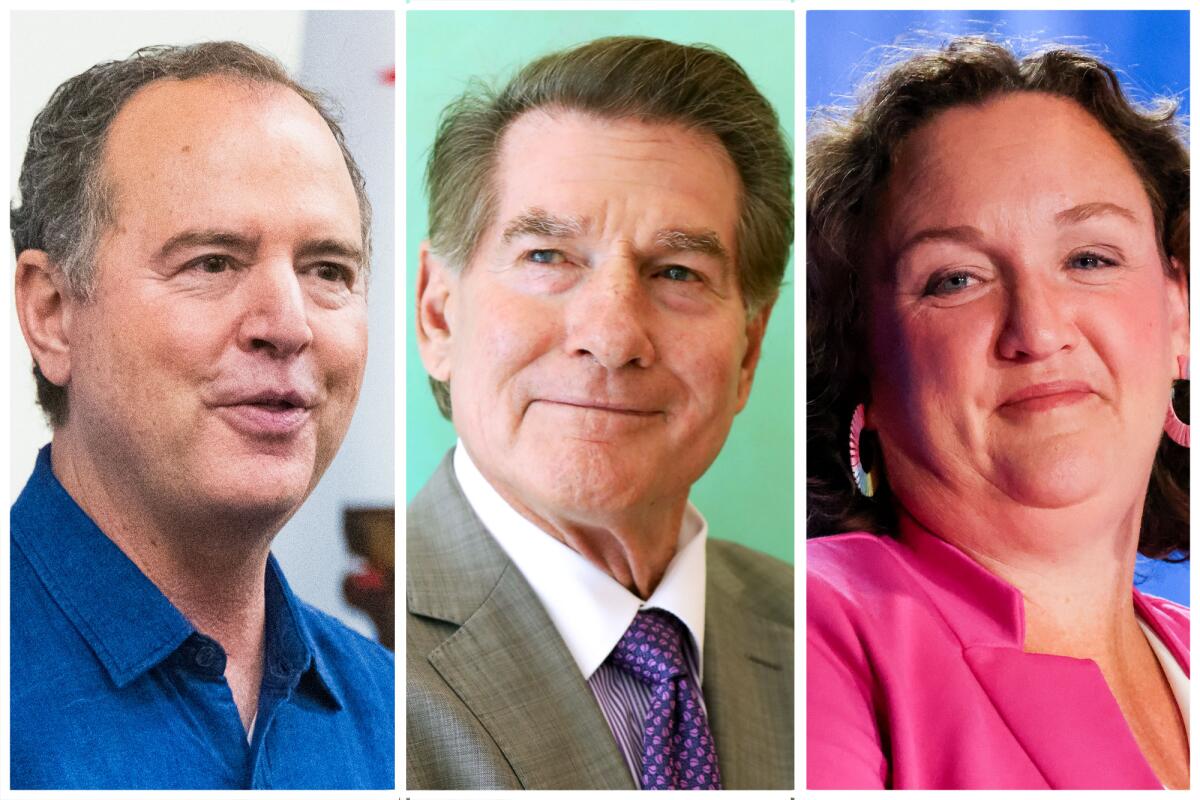Table of Contents
Good morning. It’s Friday, March 1. Here’s what you need to know to start your day.
Newsletter
Start your day right
Sign up for Essential California for news, features and recommendations from the L.A. Times and beyond in your inbox six days a week.
You may occasionally receive promotional content from the Los Angeles Times.
What to know about the crowded L.A. County district attorney race
When he was sworn in as Los Angeles County’s district attorney in 2020, George Gascón vowed to carve “a new path” for the criminal justice system in the nation’s most populous county and to “break the multigenerational cycles of violence, trauma and arrest and recidivism that has led America to incarcerate more people than any other nation.”
Over the last four years, that path has proven to be considerably uphill and riddled with obstacles and critics — including some of his own members who he hoped would walk with him. As Gascón seeks reelection, he’s going up against a crowded field of 11 other candidates hoping to take his job — including four of his own employees.
With California’s primary election fast approaching Tuesday, L.A. County voters will show just how much they support Gascón’s progressive policies at a time when residents are anxious about crime, a front-and-center issue for many.
Here are a few things to know about the race.
Gascón’s embattled first term
So what’s changed under Gascón? Times reporter James Queally explained in his voter guide to the race:
“Prosecutions of police officers for excessive force have become more of a focus, and seven people have been exonerated for crimes judges later ruled they did not commit. Gascón’s resentencing unit has also had a dramatic effect by shortening the prison terms of people who were sent away for decades as juveniles because they were tried as adults, though some say the program is moving too slowly.”
Those and other Gascón policies have proved controversial — some see him as a progressive reformer, others as soft on crime.
He put serious limits on cash bail in the county and limited the use of sentencing enhancements that can add decades to prison terms. He also drastically reduced the number of misdemeanor cases his office handles.
Many prosecutors in the office he leads — the largest in the nation — weren’t on board with his approach. Previous reporting from The Times reveal a workplace “at war with itself.” Dozens of prosecutors have quit, deep-seated discord has complicated office operations and some staff members have alleged retaliation for speaking out against his progressive policies (one person won a lawsuit).
And as crime rates increased during his first few years in office, critics and opponents seized on that as proof that his approach is failing. Gascón faced two recall efforts during his first term, though in both cases, not enough signatures were collected to qualify for a countywide vote.
A crowded field
With 12 names on the ballot, choosing the next district attorney could seem overwhelming. The incumbent Gascón is running against 11 other candidates:
- Maria Ramirez — L.A. County deputy district attorney
- John McKinney — L.A. County deputy district attorney
- Jonathan Hatami — L.A. County deputy district attorney
- Nathan Hochman — Former federal prosecutor
- Eric Siddall — L.A. County deputy district attorney
- Craig Mitchell — L.A. County Superior Court judge
- Jeff Chemerinsky — Former federal prosecutor
- Debra Archuleta — L.A. County Superior Court judge
- David Milton — Retired L.A. County Superior Court judge
- Dan Kapelovitz — Defense attorney
- Lloyd “Bobcat” Masson — San Bernardino County deputy district attorney
Most of his challengers have vowed to roll back or reverse Gascón’s policy changes, including reinstating the death penalty and increasing sentencing enhancements.
Times data reporters Gabrielle LaMarr LeMee and Sandhya Kambhampati broke down campaign fundraising for the race, which shows Gascón in fifth place behind some of his subordinates. Nathan Hochman, a former federal prosecutor, has garnered the most so far with roughly $2.7 million. That’s more than six times as much as Gascón’s campaign has raised.
Hochman ran for state attorney general as a Republican in 2022, but did not designate a party affiliation in this race. His donors include hundreds of real estate and finance interests.
Gascón meanwhile has not seen the same level of support from big donors ahead of the primary, though Gabrielle and Sandhya note that he’s expected to advance to the general election in November, so it could be that they’re saving their money for the final matchup.
Crime and patience
Statewide, both violent crime and property crime have been trending up in recent years, according to data compiled by the Public Policy Institute of California. But the rise in neighboring Orange County and north in Sacramento County — “home to more traditional prosecutors” — has been notably steeper than in L.A. County, James noted.
In Los Angeles, city officials reported a drop in violent crime for 2023. Property crimes rose 3%, which officials attributed in part to increased auto theft. Yet residents and businesses are on edge with smash-and-grab thefts.
In terms of prosecutions, the number of felony cases filed during Gascón’s first term was only slightly lower than it was under his predecessor, Jackie Lacey. According to data obtained by The Times through a public records request, Gascón’s office filed 51% of cases from 2021 to 2023 compared with 54% during the last two years of Lacey’s tenure.
Magnus Lofstrum, director of criminal justice at the Public Policy Institute of California, told me crime rates are “not the most appropriate measure for having a sense of whether a D.A. has been successful or not.”
There are myriad factors influencing crime that the district attorney doesn’t control, he said, including policing strategies and staffing, the array of pandemic-related effects, along with poverty, homelessness and other socioeconomic challenges.
If any incumbent wants to keep their job and policies intact, Lofstrum said, it’s important that they clearly point to what changes they’ve made and the resulting positive effects.
Part of that challenge is that it can take years of research to evaluate those effects, but that’s a hard sell to voters who are seeing crime on the rise here and now.
“When there [are] concerns that public safety is deteriorating, it’s going to be something that is on our minds,” Lofstrum said. “I think it’s especially in those times when patience is limited.”
Still deciding how to vote? Check out James’ voter guide for more on the candidates.
Today’s top stories
Politics and elections
Climate and environment
Crime and courts
More big stories
Get unlimited access to the Los Angeles Times. Subscribe here.
Today’s great reads
Newsom wants to build a $16-billion water tunnel. Will it destroy California’s delta? The Delta Conveyance Project is a key component of Gov. Gavin Newsom’s strategy for a hotter, drier California. Opponents say it will be an ecological disaster.
Other great reads
How can we make this newsletter more useful? Send comments to essentialcalifornia@latimes.com.
For your downtime

Rodrick Dixon performs as the lead character in Alexander Zemlinsky’s, “The Dwarf,” during a dress rehearsal at the Dorothy Chandler Pavilion in Los Angeles.
(Genaro Molina/Los Angeles Times)
Going out
Staying in
And finally … a great photo
Show us your favorite place in California! We’re running low on submissions. Send us photos that scream California and we may feature them in an edition of Essential California.

Furniture made by Vince Skelly, a woodworker who takes single blocks of wood and turns them into benches, chairs, stools, tables and sculptures that straddle functional and decorative purposes, is shown in his home in Claremont.
(Allen J. Schaben / Los Angeles Times)
Today’s great photo is from Times photographer Allen J. Schaben at the Claremont home of a woodworker who creates one-of-a-kind, functional furniture pieces that decorate his home.
Have a great day, from the Essential California team
Ryan Fonseca, reporter
Kevinisha Walker, multiplatform editor
Stephanie Chavez, deputy metro editor
Check our top stories, topics and the latest articles on latimes.com.



